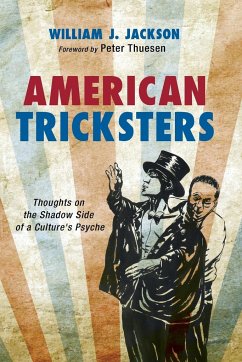
American Tricksters

PAYBACK Punkte
15 °P sammeln!
Tricksters are known by their deeds. Obviously not all the examples in American Tricksters are full-blown mythological tricksters like Coyote, Raven, or the Two Brothers found in Native American stories, or superhuman figures like the larger-than-life Davy Crockett of nineteenth-century tales. Newer expressions of trickiness do share some qualities with the Trickster archetype seen in myths. Rock stars who break taboos and get away with it, heroes who overcome monstrous circumstances, crafty folk who find a way to survive and thrive when the odds are against them, men making spectacles of them...
Tricksters are known by their deeds. Obviously not all the examples in American Tricksters are full-blown mythological tricksters like Coyote, Raven, or the Two Brothers found in Native American stories, or superhuman figures like the larger-than-life Davy Crockett of nineteenth-century tales. Newer expressions of trickiness do share some qualities with the Trickster archetype seen in myths. Rock stars who break taboos and get away with it, heroes who overcome monstrous circumstances, crafty folk who find a way to survive and thrive when the odds are against them, men making spectacles of themselves by feeding their astounding appetites in public--all have some trickster qualities. Each person, every living creature who ever faced an obstacle and needed to get around it, has found the built-in trickster impulse. Impasses turn the trickster gene on, or stimulate the trick-performing imagination--that's life. To explore the ways and means of trickster maneuvers can alert us to pitfalls, help us appreciate tricks that are entertaining, and aid us in fending off ploys which drain our resources and ruin our lives. Knowing more about the Trickster archetype in our psyches helps us be more self-aware.













